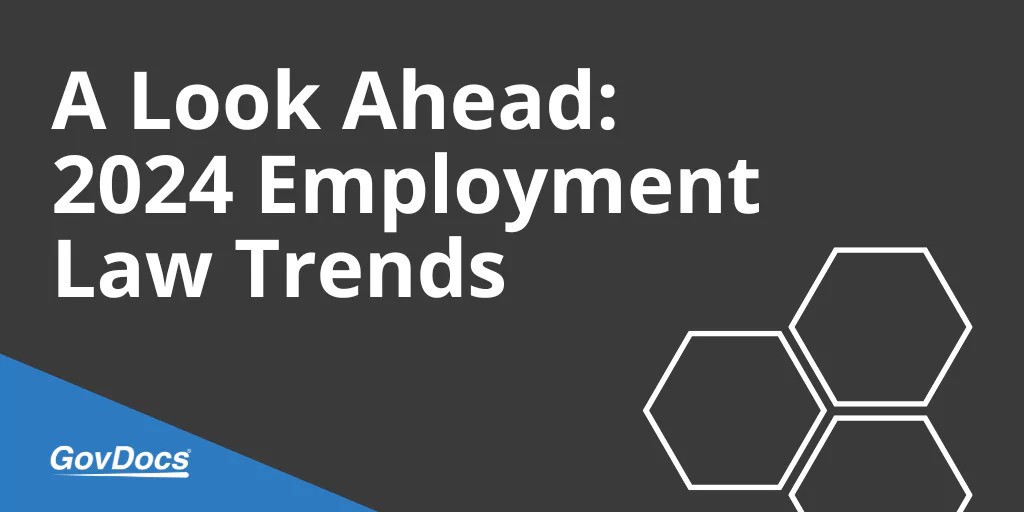Financial News
A Look Ahead: 2024 Employment Law Compliance Trends

Eagan, Minn. - A flurry of employment laws and amendments, effective Jan. 1, 2024, have created compliance challenges for employers. Examining the trends which may be expected in 2024, this overview discusses key aspects from GovDocs’ December Webinar, A Look Back, A Look Ahead: 2023 Employment Law Trends.
Non-Compete Agreements
Previously, New York State passed legislation which prohibited non-compete agreements, specific restrictive covenants, and authorized individuals to pursue civil action against employers or persons alleged to have violated a non-compete ban.
This legislation, however, came to a screeching halt when the New York Governor vetoed the bill on Dec. 19, 2023. According to a Dec. 22, 2023 New York Times article, the Governor believed the legislation overreached and advocated for narrowing its scope to apply solely to lower-wage workers.
In 2024, further legislation in New York may be expected to align the law into a form that Governor Hochul will sign. It is also anticipated that other states will introduce legislation in 2024 aiming to implement non-compete limitations or bans.
At the national level, the Federal Trade Commission’s (FTC) proposed rule is awaiting the final vote. If approved, it would institute a comprehensive nationwide ban on non-compete agreements. The final vote is scheduled to occur in April 2024, at the earliest.
Described as an “incredibly broad ban on non-competes” by Dan Prokott, a partner at Faegre, Drinker, Biddle and Reath during GovDocs’ December Webinar, this rule would eliminate all new and existing non-compete agreements. Should the FTC rule pass this year, expect to see additional activity challenging the decision.
Joint Employer Rule in 2024
The National Labor Relations Board (NLRB) issued its Final Rule establishing a new standard under the National Labor Relations Act for determining whether two employers are “joint employers.” The effective date for this rule has been extended to Feb. 26, 2024.
There has already been opposition to this rule from the US Chamber of Commerce and a coalition of businesses who filed a lawsuit against the NLRB. The lawsuit alleges the joint employer rule is statutorily unauthorized and arbitrary and capricious. It is expected there will be continued opposition to this new standard throughout 2024.
Paid Leave Updates in 2024
Similar to past years, it is expected that additional state and local jurisdictions will continue to pass paid leave laws in 2024. For example, in late 2023, Illinois and Minnesota passed state-wide paid leave laws.
This left local jurisdictions scrambling to amend their existing ordinances to align with the new state requirements, which became effective on Jan. 1, 2024. As minor differences remain in the local and state laws, employers should understand the requirements at both levels to ensure compliance in these two states.
Raising the Exempt Salary Threshold Level
The Department of Labor is again proposing to raise the exempt salary threshold level. During GovDocs’ 2023 Employment Law Trends webinar, the speakers did not expect this to have broad implications for larger employers, but Kevin Mosher, partner with Thompson Coe, indicated it was likely to affect retail and hospitality the most where shift managers may be earning less than $55,000.
In these situations, employers should understand they do not necessarily need to raise salaries, but if they don’t do so, any exempt employee making less than the new threshold level would then be eligible for and need to be paid overtime. Again, this is if the proposed rule passes. Employers are advised to monitor potential changes and their impact on overtime eligibility.
Other Expected 2024 Employment Law Compliance Trends
As the final year of the Biden Administration unfolds, a significant amount of regulatory activity is expected in the latter half of 2024. Anticipated developments include increased state-level pushes for pay transparency, continued legislation for paid time off, and ongoing minimum wage increases nationwide.
In summary, while some trends echo those of 2023, vigilant monitoring of employment law legislation in 2024 is crucial for businesses to adapt to changes throughout the year.
About GovDocs
GovDocs simplifies employment law compliance for large employers in the U.S. and Canada. The GovDocs software program integrates three solutions in one convenient place to help master the employment laws impacting businesses. Whether businesses manage labor law posters, minimum wage, or paid leave programs, their products cut through research time, provide proactive insights into the ever changing landscape of employment laws, and reduce the risk of noncompliance. The company is headquartered in Eagan, Minn.
The GovDocs Poster Store simplifies posting compliance for employers with less than 30 locations across all industries, offering a variety of posting products to meet their labor law compliance needs.
GovDocs Employment Law News is intended for market awareness only, it is not to be used for legal advice or counsel.
Media Contact

Name
GovDocs
Contact name
Patrick Schaber
Contact phone
(888) 273-3274
Contact address
1305 Corporate Center Dr., Suite 400
City
Eagan
State
MN
Zip
55121
Country
United States
Url
http://govdocs.com/
Stock quotes supplied by Barchart
Quotes delayed at least 20 minutes.
By accessing this page, you agree to the following
Privacy Policy and Terms and Conditions.



